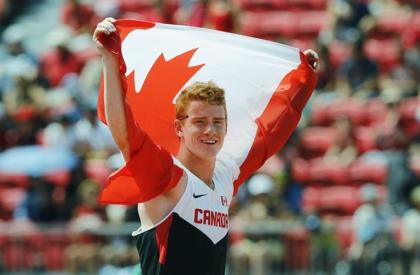Canada’s Pan Am Games performance a result of Own the Podium creating ‘culture of winning’

TORONTO – On Day 11 of the Pan Am Games, Shawnacy Barber won gold for Canada in the men’s pole vault competition. Years earlier he had an important choice to make. Barber was born in New Mexico but spent much of his youth in Ontario. With dual citizenship he had a choice whether to represent the United States or Canada in international competition.
He chose Canada. It’s anecdotal, perhaps, but it’s further evidence of the shift in culture in Canadian amateur sports over the last decade or so. Much of that shift is thanks to the work of the Own the Podium program. It was created to help Canadian athletes reach medal finishes at the 2010 Vancouver Winter Olympics, but has continued to expand and improve in the years since.
John Furlong, the Own the Podium board chairman, thinks examples like Barber’s are the new reality, and just a small part of the impact the program has had.
“The wait and see thing is kind of slipping away,” Furlong said in an interview this week. “Athletes are going to think about ‘Where can I develop fastest, and where’s my best chance to be successful.’ We have to be in that arena with other countries. All sports are becoming like the hockey players – they all want to play for Canada.”
Furlong and Anne Merklinger, Own the Podium CEO and a former national team swimmer, believe that Canada’s record-setting performance at the Pan Am Games is further evidence of Own the Podium paying off. Where they are hoping it will truly pay off is at next year’s Summer Olympics in Rio.
“We’re 13 months out of Rio so the true performance assessment for us comes in about eight weeks when the summer world championships are completed,” Merklinger said. “That is the most important performance benchmark for us. [Pan Am Games] is important too, it’s part of the process.
“This is a dry run for what many have called a mini-Olympic. The environment here is as close as it can get to a Summer Olympic Games. So those athletes that have performed in a pressure packed environment, at home, that’s an experience they’re going to build on. They’ll go into Rio and be better equipped to replicate that.”
“We can’t afford to be satisfied,” Furlong added. “We’re obviously happy we’re going to come away with good results, it’s a nice thing to happen. But we need to keep perspective. What’s great here is the experience of being in the middle of a very loud, highly energized, agitated atmosphere. It prepares athletes, it teaches them how to win, how to deal with the intangibles.”

Perhaps the most interesting new development in Own the Podium is how it’s targeting younger athletes. Up until London its primary focus was on supporting athletes for the next upcoming games. But now, thanks in part to a $20 million investment from the government, they are focusing on what Merklinger calls ‘Next-Gen’ athletes – athletes who they identify as being medal contenders in eight to ten years. Own the Podium is also now putting a greater focus on summer athletes, not just winter.
“What’s happening now is the result of momentum we’ve been building,” Furlong said. “Are we there yet? No, but we’re certainly getting there. We’re going to shatter the Pan Am Games record for medals. It may not sound like a lot but it is a big deal and it’s getting our athletes accustomed to the culture of winning.”
The other side affect the Pan Am Games has had on Toronto is creating whispers about a future Olympics bid. It’s a contentious issue with citizens and politicians but it’s a conversation that was bound to happen. Rio hosted the Pan Am Games in 2007, and nine years later will host the Olympics. It’s far from official but Toronto’s name is already being bandied about as a potential host in 2024.
“There will probably be a feeling on Monday of euphoria and people will wake up and ask themselves ‘I wonder what it would be like if we went after the Olympics,’ “ Furlong said. “Toronto is a pretty great city, it’s a diverse city, it’s enjoying itself. I think there’s a big smile on its face right now because they feel like they’ve done a pretty good thing here.”
When Thomas Bach was named the new president of the International Olympic Committee in 2013, he almost immediately brought in changes to the bidding process, and the requirements on the host cities, as the cost of hosting skyrocketed and scared cities off. Those changes would appear to benefit a Toronto bid.
“The IOC has put it down to countries and said ‘We want to see what you can do. Show us a different way.’ They’ve even gone so far as to talk about dual-countries, dual-cities, temporary venues, and different ways to do things. There’s a lot of things you can do with a creative mind. And I think for a city like that’s a very good opportunity.”
More coverage from Yahoo Sports:
Ian Denomme is an editor and writer for Yahoo Sports. Email him at denomme@yahoo-inc.com or follow him on Twitter.

 Yahoo Sports
Yahoo Sports 

